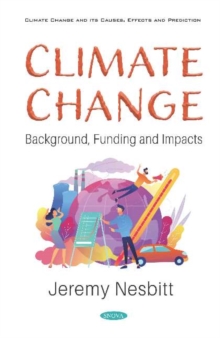Regarding climate changes, a key question has been the degree to which humans and natural factors have influenced observed global climate change.
Chapter 1 traces the evolution of scientific understanding and confidence regarding the drivers of recent global climate change.
Chapter 2 reviews how U.S. agencies address climate change as a potential driver of global migration.
Chapter 3 examines reported federal funding from 2010 to 2017 and the extent to which reports on such funding are clearly linked to the federal fiscal exposure to climate change; the extent to which selected agencies reported climate change funding that supports programs where addressing climate change is the primary purpose; and the extent to which the primary purpose programs are fragmented, overlapping, or duplicative.
The costs of recent weather disasters have illustrated the need for planning for climate change risks and investing in resilience as reported in chapter 4.
For more than a decade, federal agencies have grappled with how to address climate change effects when implementing the Endangered Species Act of 1973 (ESA).
As set forth by Congress, one of the main purposes of the ESA is to "provide a means whereby the ecosystems upon which endangered species and threatened species depend may be conserved." Chapter 5 analyzes the courts' role in shaping how the Services have factored climate change effects into ESA decisions and recent 2019 regulatory developments that aim to clarify how the Services consider and address climate change in their ESA decisions.
Many governments hold that environmental degradation and climate change pose international and trans-boundary risks to human populations, economies, and ecosystems.
International financial assistance, or foreign aid, has been a principal method for governments to support actions on global environmental problems in lower-income countries.
As discussed in chapter 6 and 7, this assistance may include grants, loans, loan guarantees, export credits, insurance products, and private sector investment.
On June 1, 2017, President Trump announced his intent to withdraw the United States from the Paris Agreement (PA), an international accord to address climate change over the coming century.
Some observers argue that the Administration's decision to withdraw from the PA will (1) reduce the U.S. standing in the world by making the United States an international outlier on climate change, (2) strengthen perceptions that the United States is withdrawing from its traditional position of world leadership and becoming more inward-focused or even isolationist, (3) create an opportunity for China to assume a position of world leadership on climate change and perhaps other issues, and (4) make the United States appear less reliable as a negotiating partner, which could make it harder for the United States in the future to secure foreign cooperation for addressing other issues of mutual interest or to call on other countries to abide by their commitments in other international agreements as reported in chapter 8.
Surface transportation is a major source of carbon dioxide (CO2) in the atmosphere, the main human-related greenhouse gas (GHG) contributing to climate change.
At the same time, the effects of climate change, such as extreme heat, sea level rise, and stronger storms, pose a threat to transportation infrastructure.
Chapter 9 seeks to address these two aspects of climate change with mitigation provisions that aim to reduce GHG emissions from surface transportation and adaptation provisions that aim to make the surface transportation system more resilient to a changing climate.
For policymakers considering actions to reduce GHG emissions, various policy instruments are available.
Over the last 15 years, many legislative proposals have involved market-based approaches, such as a GHG emissions cap-and-trade system or a carbon tax.
These particular approaches may be considered in the 116th Congress and are discussed in chapter 10.
As mandated by Congress, the U.S. Global Change Research Program produces regular National Climate Assessment (NCA) reports on the state of scientific knowledge about climate change and its effects on human and natural systems in the United States.
According to NCA4, "annual losses in some economic sectors are projected to reach hundreds of billions of dollars by the end of the century" provided continued growth in emissions at historic rates.
The findings of the NCA4 are the focus of chapter 11.
In light of public concern over climate change, some stakeholders have asked to what extent publicly traded companies should disclose their climate-related risks.
As reported in chapter 12, while current SEC requirements do not address climate-related risks expressly, publicly traded companies must disclose such risks if they are "material" under federal securities laws.

